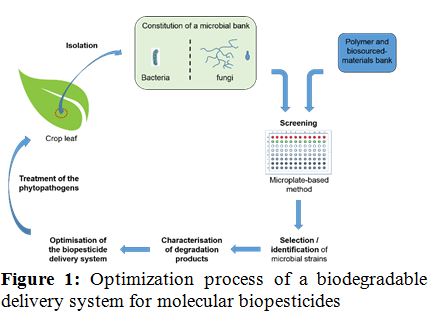
Nicolas Le Goff
Enzyme and Cellular Engineering Laboratory, UTC, France
Title: Recalcitrant polymers biodegradation by phylloplanic bacterial and fungal isolates: identification of efficient strains and characterization of the degradation products
Biography
Biography: Nicolas Le Goff
Abstract
Statement of the Problem: The excessive use of chemical pesticides in agriculture represents healthcare and environmental concerns. A possible alternative to fight against phytopathogens is the use of biopesticides such as secondary metabolites or enzymes. But the stabilization of those molecules to obtain long term and higher efficiency on plant is still an issue. One proposed solution is the encapsulation of biopesticides in polymeric materials. Thus, the biodegradability of those materials by microbes present on the crops leaves has to be evaluated for the selection of the most suitable encapsulating agent. The work presented here consists in the isolation of microorganisms from crops, the screening of their degradation abilities and the identification of efficient strains.
Methodology & Theoretical Orientation: First, bacteria and fungi have been isolated from different crops leaves (corn, rapeseed, cabbage and sugar beets). Two isolation techniques were used: the suspension dilution technique and the foliar imprints method. A small scale microplate-based screening method was optimized to select both bacteria and fungi able to grow with different polymeric materials as sole carbon source. Secondly, the degradation products of the polymers were characterized with different analytical techniques (GC-MS, SEC, isotopic labeling) to identify the metabolic pathways and to prevent to impact the environment with toxic metabolites.
Findings: 117 fungal and 212 bacterial isolates have been obtained and screened for the degradation of several polymers (pHEMA, pMMA, pNIPAM, pAcrylate, pAcrylamide and bio-sourced polymer). First results show good abilities of the microbial bank to degrade mainly pHEMA and pAcrylamide.
Conclusion & Significance: Numerous microbial strains isolated in this work are able to degrade polymeric and biobased materials. This should allow the development of new biodegradable vectorization systems for the stabilization of molecular biopesticides as an alternative to chemicals, but also of bioremediation processes.
Recent Publications
- Transparency Market Research (2016) Biopesticides Market - Global Industry Analysis, Size, Share, Growth and Forecast 2015 – 2023, 95.
- Villaverde JJ (2014) Chapter 15 – Challenges of Biopesticides Under the European Regulation (EC) No. 1107/2009: An Overview of New Trends in Residue Analysis. Studies in Natural Products Chemistry 43: 437-482.
- Chilukoti N (2010) Biotechnological approaches to develop bacterial chitinases as a bioshield against fungal diseases of plants. Critical Rewiews in Biotechnology 30(3): 231-241.
- Salgado M (2015) Encapsulation of resveratrol on lecithin and b-glucans to enhance its action against Botrytis cinerea. Journal of Food Engineering 165:13–21.
- Ya-Ting X (2011) Molecularly imprinted polymer microspheres enhanced biodegradation of bisphenol A by acclimated activated sludge. Water Research 45(3): 1189-1198.


